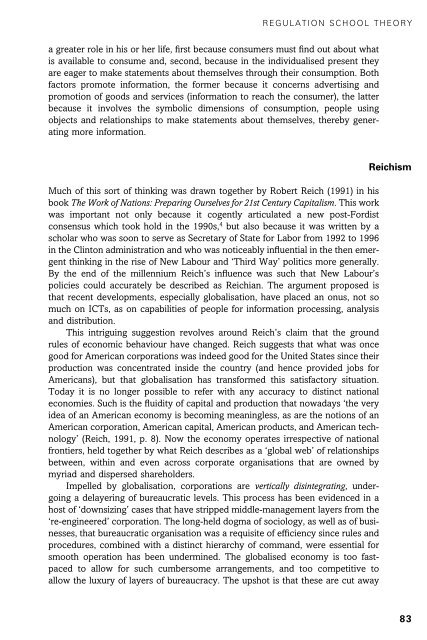Theories of the Information Society, Third Edition - Cryptome
Theories of the Information Society, Third Edition - Cryptome
Theories of the Information Society, Third Edition - Cryptome
You also want an ePaper? Increase the reach of your titles
YUMPU automatically turns print PDFs into web optimized ePapers that Google loves.
REGULATION SCHOOL THEORY<br />
1<br />
a greater role in his or her life, first because consumers must find out about what<br />
is available to consume and, second, because in <strong>the</strong> individualised present <strong>the</strong>y<br />
are eager to make statements about <strong>the</strong>mselves through <strong>the</strong>ir consumption. Both<br />
factors promote information, <strong>the</strong> former because it concerns advertising and<br />
promotion <strong>of</strong> goods and services (information to reach <strong>the</strong> consumer), <strong>the</strong> latter<br />
because it involves <strong>the</strong> symbolic dimensions <strong>of</strong> consumption, people using<br />
objects and relationships to make statements about <strong>the</strong>mselves, <strong>the</strong>reby generating<br />
more information.<br />
Reichism<br />
1<br />
1<br />
2<br />
1<br />
1<br />
Much <strong>of</strong> this sort <strong>of</strong> thinking was drawn toge<strong>the</strong>r by Robert Reich (1991) in his<br />
book The Work <strong>of</strong> Nations: Preparing Ourselves for 21st Century Capitalism. This work<br />
was important not only because it cogently articulated a new post-Fordist<br />
consensus which took hold in <strong>the</strong> 1990s, 4 but also because it was written by a<br />
scholar who was soon to serve as Secretary <strong>of</strong> State for Labor from 1992 to 1996<br />
in <strong>the</strong> Clinton administration and who was noticeably influential in <strong>the</strong> <strong>the</strong>n emergent<br />
thinking in <strong>the</strong> rise <strong>of</strong> New Labour and ‘<strong>Third</strong> Way’ politics more generally.<br />
By <strong>the</strong> end <strong>of</strong> <strong>the</strong> millennium Reich’s influence was such that New Labour’s<br />
policies could accurately be described as Reichian. The argument proposed is<br />
that recent developments, especially globalisation, have placed an onus, not so<br />
much on ICTs, as on capabilities <strong>of</strong> people for information processing, analysis<br />
and distribution.<br />
This intriguing suggestion revolves around Reich’s claim that <strong>the</strong> ground<br />
rules <strong>of</strong> economic behaviour have changed. Reich suggests that what was once<br />
good for American corporations was indeed good for <strong>the</strong> United States since <strong>the</strong>ir<br />
production was concentrated inside <strong>the</strong> country (and hence provided jobs for<br />
Americans), but that globalisation has transformed this satisfactory situation.<br />
Today it is no longer possible to refer with any accuracy to distinct national<br />
economies. Such is <strong>the</strong> fluidity <strong>of</strong> capital and production that nowadays ‘<strong>the</strong> very<br />
idea <strong>of</strong> an American economy is becoming meaningless, as are <strong>the</strong> notions <strong>of</strong> an<br />
American corporation, American capital, American products, and American technology’<br />
(Reich, 1991, p. 8). Now <strong>the</strong> economy operates irrespective <strong>of</strong> national<br />
frontiers, held toge<strong>the</strong>r by what Reich describes as a ‘global web’ <strong>of</strong> relationships<br />
between, within and even across corporate organisations that are owned by<br />
myriad and dispersed shareholders.<br />
Impelled by globalisation, corporations are vertically disintegrating, undergoing<br />
a delayering <strong>of</strong> bureaucratic levels. This process has been evidenced in a<br />
host <strong>of</strong> ‘downsizing’ cases that have stripped middle-management layers from <strong>the</strong><br />
‘re-engineered’ corporation. The long-held dogma <strong>of</strong> sociology, as well as <strong>of</strong> businesses,<br />
that bureaucratic organisation was a requisite <strong>of</strong> efficiency since rules and<br />
procedures, combined with a distinct hierarchy <strong>of</strong> command, were essential for<br />
smooth operation has been undermined. The globalised economy is too fastpaced<br />
to allow for such cumbersome arrangements, and too competitive to<br />
allow <strong>the</strong> luxury <strong>of</strong> layers <strong>of</strong> bureaucracy. The upshot is that <strong>the</strong>se are cut away<br />
83
















